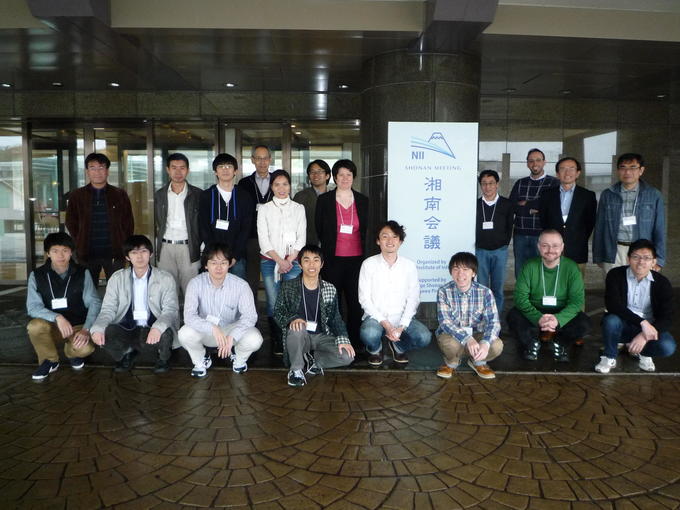NO.023 Hybrid Systems: Theory and Practice, Seriously
April 23 - 26, 2012 (Check-in: April 22, 2012 )
Organizers
- Ichiro Hasuo
- University of Tokyo, Japan
- Takuro Kutsuna
- Toyota Central R&D Labs, Japan
- Toshimitsu Ushio
- Osaka University, Japan

Overview
You can see the seminar detail in the following web page.
http://www-mmm.is.s.u-tokyo.ac.jp/~ichiro/shonanHybrid/
Hybrid Systems
Hybrid systems—those which exhibit both continuous flow and discrete jump dynamics—are everywhere in the modern world, with cars, airplanes and all others controlled by computers.
Their failure can therefore have an immense impact on human lives and infrastructures, posing the problem of their quality assurance—getting hybrid systems right—as a pressing one.
Need of Hybrid Research Community for Hybrid Systems
The name hybrid system itself manifests a research challenge: due to the heterogeneity of its dynamics as well as the diversity of its applications, no research effort is comprehensive if it stays within the realm of a single, already established, research discipline. Currently there are two theoretical “camps” aiming at hybrid applications:
– control theory, originally specialized in flow dynamics with the tool of differential equations; and
– theory of system verification, with its original goal to tame the astronomically complex jump dynamics of computer systems.
Obviously the two communities should join forces and bring their knowledge together, towards the goal of establishing a solid theoretical ground for hybrid systems.
One should not forget about another very important group: practitioners in the industry who are struggling with vastly complex hybrid systems and concrete quality assurance criteria. A meeting in Japan has an advantage of attracting more people from the industry, since Japan is one of the places in the world that see the greatest aggregation of hybrid applications.
The proposed SHONAN Meeting hopes to serve as a meeting point of these three camps—two theoretical ones that have been developed rather separately (up to now, to our regret), and the community of practitioners with whom theoreticians have not had much contact.
Wanna Be Serious? Then Be Informal!
We all know, however, that such interdisciplinary attempts are very likely to fail. Piet Hut, an astrophysicist and Professor of Interdisciplinary Studies at Institute of Advanced Study,
Princeton, US, suggested one way to cope with the difficult task. It goes as follows.
Why is it that two people from different disciplines do not understand each other? Schematically (see the attached figure):
– “knowledge” can be categorized into the explicit one (that he is aware of using it himself) and the tacit one (that he uses too but he is unaware of doing so);
– through discussions, usually only explicit knowledge is communicated;
– but the uncommunicated, tacit part of knowledge is often the most important piece for the mutual understanding.
Thus a question: how do we communicate tacit knowledge?
Piet’s answer is clear enough: by being informal! In addition to formal occasions like talks/lectures, it is essential to mingle together over meals, drinks, excursions, etc. That is his experience and also what we all witnessed throughout Adventures of Categories, a project for interdisciplinary collaboration for which Piet Hut and Ichiro Hasuo (one of the organizers for this proposal) were organizers.
Shonan Meeting as an Optimal Venue
For such “serious” interdisciplinary collaboration, the scheme of NII Shonan Meeting offers an optimal setup with intensive interaction lasting four days. We will feature much more time for free-style discussion than workshops would do usually; specifically alteration between 1-hour talk(s) and 1-hour discussion, with which we have had a success in the aforementioned Adventures of Categories project. The talks are expected to introduce the very basics of each discipline to establish a single common ground, as well as to present some cutting-edge results.
The collaboration between theoretical camps and practitioners which we seek to initiate during this meeting will prove invaluable for hybrid system research in the coming decades, we believe.
